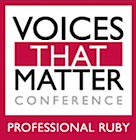 JS.Class is an attempt at making JavaScript more Ruby-like. More specifically, it’s a library that makes object oriented development easier in JavaScript (in comparison to JS’s prototype technique, at least) by implementing Ruby’s core object, module, and class systems as well as some of Ruby’s meta-programming techniques.
JS.Class is an attempt at making JavaScript more Ruby-like. More specifically, it’s a library that makes object oriented development easier in JavaScript (in comparison to JS’s prototype technique, at least) by implementing Ruby’s core object, module, and class systems as well as some of Ruby’s meta-programming techniques.
As well as ports of Enumerable, Observable, Comparable, and Forwardable, you get subclassing, mixins, reflection, late-binding arguments, singleton methods, method binding, and Ruby-like inheritance. Of course, JavaScript gives access to many of these elements already, but JS.Class presents things with a Ruby flavor.
The official JS.Class site is particularly well done and each main area is well documented. Read More







 Garry Dolley has developed
Garry Dolley has developed 






 What’s Hot on
What’s Hot on 
